- Home
- Raymond Chandler
Red Wind Page 14
Red Wind Read online
Page 14
I shook my head. “He stole them, didn’t he? He killed a man. What does he do for a living?”
“His wife has money,” Kathy Home said. “He just plays around with goldfish.”
“Goldfish?” I said. “To hell with him.”
She went on out.
II
THE last time I had been in the Gray Lake district I had helped a D.A.’s man named Bernie Obis shoot a gunman named Poke Andrews. But that was higher up the hill, farther away from the lake. This house was on the second level, in a loop the street made rounding a spur of the hill. It stood by itself high up, with a cracked retaining wall in front and several vacant lots behind.
Being originally a double house it had two front doors and two sets of front steps. One of the doors had a sign tacked over the grating that masked the peep window: Ring 1432.
I parked my car and went up right-angle steps, passed between two lines of pinks, went up more steps to the side with the sign. That should be the roomer’s side. I rang the bell. Nobody answered it, so I went across to the other door. Nobody answered that one either.
While I was waiting a gray Dodge coupé whished around the curve and a small neat girl in blue looked up at me for a second. I didn’t see who else was in the car. I didn’t pay much attention. I didn’t know it was important.
I took out Kathy Home’s key and let myself into a closed living-room that smelled of cedar oil. There was just enough furniture to get by, net curtains, a quiet shaft of sunlight under the drapes in front. There was a tiny breakfast room, a kitchen, a bedroom in the back that was obviously Kathy’s, a bathroom, another bedroom in front that seemed to be used as a sewing-room. It was this room that had the door cut through to the other side of the house.
I unlocked it and stepped, as it were, through a mirror. Everything was backwards, except the furniture. The living-room on that side had twin beds, didn’t have the look of being lived in.
I went towards the back of the house, past the second bathroom, knocked at the shut door that corresponded to Kathy’s bedroom.
No answer. I tried the knob and went in. The little man on the bed was probably Peeler Mardo. I noticed his feet first, because although he had on trousers and a shirt, his feet were bare and hung over the end of the bed. They were tied there by a rope around the ankles.
They had been burned raw on the soles. There was a smell of scorched flesh in spite of the open window. Also a smell of scorched wood. An electric iron on a desk was still connected. I went over and shut it off.
I went back to Kathy Home’s kitchen and found a pint of Brooklyn Scotch in the cooler. I used some of it and breathed deeply for a little while and looked out over the vacant lots. There was a narrow cement walk behind the house and green wooden steps down to the street.
I went back to Peeler Mardo’s room. The coat of a brown suit with a red pin stripe hung over a chair with the pockets turned out and what had been in them on the floor.
He was wearing the trousers of the suit, and their pockets were turned out also. Some keys and change and a handkerchief lay on the bed beside him, and a metal box like a woman’s compact, from which some glistening white powder had spilled. Cocaine.
He was a little man, not more than five feet four, with thin brown hair and large ears. His eyes had no particular color. They were just eyes, and very wide open, and quite dead. His arms were pulled out from him and tied at the wrists by a rope that went under the bed.
I looked him over for bullet or knife wounds, didn’t find any. There wasn’t a mark on him except his feet. Shock or heart failure or a combination of the two must have done the trick. He was still warm. The gag in his mouth was both warm and wet.
I wiped off everything I had touched, looked out of Kathy’s front window for a while before I left the house.
It was three-thirty when I walked into the lobby of the Mansion House, over to the cigar counter in the corner. I leaned on the glass and asked for Camels.
Kathy Home flicked the pack at me, dropped the change into my outside breast pocket, and gave me her customer’s smile.
“Well? You didn’t take long,” she said, and looked side-wise along her eyes at a drunk who was trying to light a cigar with the old-fashioned flint and steel lighter.
“It’s heavy,” I told her. “Get set.”
She turned away quickly and flipped a pack of paper matches along the glass to the drunk. He fumbled for them, dropped both matches and cigar, scooped them angrily off the floor and went off looking back over his shoulder, as if he expected a kick.
Kathy looked past my head, her eyes cool and empty.
“I’m set,” she whispered.
“You cut a full half,” I said. “Peeler’s out. He’s been bumped off—in his bed.”
Her eyes twitched. Two fingers curled on the glass near my elbow. A white line showed around her mouth. That was all.
“Listen,” I said. “Don’t say anything until I’m through. He died of shock. Somebody burned his feet with a cheap electric iron. Not yours. I looked. I’d say he died rather quickly and couldn’t have said much. The gag was still in his mouth. When I went out there, frankly, I thought it was all hooey. Now I’m not so sure. If he gave up his dope, we’re through, and so is Sype, unless I can find him first. Those workers didn’t have any inhibitions at all. If he didn’t give up, there’s still time.”
Her head turned, her set eyes looked towards the revolving door of the lobby entrance. White patches glared in her cheeks.
“What do I do?” she breathed.
I poked at a box of wrapped cigars, dropped her key into it. Her long fingers got it out smoothly, hid it.
“When you get home you find him. You don’t know a thing. Leave the pearls out, leave me out. When they check his prints they’ll know he had a record and they’ll just figure it was something caught up with him.”
I broke my cigarettes open and lit one, watched her for a moment. She didn’t move an inch.
“Can you face it down?” I asked. “If you can’t, now’s the time to speak.”
“Of course.” Her eyebrows arched. “Do I look like a torturer?”
“You married a crook,” I said grimly.
She flushed, which was what I wanted. “He isn’t! He’s just a damn fool! Nobody thinks any the worse of me, not even the boys down at Headquarters.”
“All right. I like it that way. It’s not our murder, after all. And if we talk now, you can say good-by to any share in any reward—even if one is ever paid.”
“Darn tootin’,” Kathy Home said pertly. “Oh, the poor little runt,” she almost sobbed.
I patted her arm, grinned as heartily as I could and left the Mansion House.
III
THE Reliance Indemnity Company had offices in the Graas Building, three small rooms that looked like nothing at all. They were a big enough outfit to be as shabby as they liked.
The resident manager was named Lutin, a middle-aged bald-headed man with quiet eyes, dainty fingers that caressed a dappled cigar. He sat behind a large, well-dusted desk and stared peacefully at my chin.
“Carmady, eh? I’ve heard of you.” He touched my card with a shiny little finger. “What’s on your mind?”
I rolled a cigarette around in my fingers and lowered my voice. “Remember the Leander pearls?”
His smile was slow, a little bored. “I’m not likely to forget them. They cost this company one hundred and fifty thousand dollars. I was a cocky young adjuster then.”
I said: “I’ve got an idea. It may be all haywire. It very likely is. But I’d like to try it out. Is your twenty-five grand reward still good?”
He chuckled. “Twenty grand, Carmady. We spent the difference ourselves. You’re wasting time.”
“It’s my time. Twenty it is then. How much co-operation can I get?”
“What kind of co-operation?”
“Can I have a letter identifying me to your other branches? In case I have to go out of the State. In case I ne
ed kind words from some local law.”
“Which way out of the State?”
I smiled at him. He tapped his cigar on the edge of a tray and smiled back. Neither of our smiles was honest.
“No letter,” he said. “New York wouldn’t stand for it. We have our own tie-up. But all the co-operation you can use, under the hat. And the twenty grand, if you click. Of course you won’t.”
I lit my cigarette and leaned back, puffed smoke at the ceiling.
“No? Why not? You never got those marbles. They existed, didn’t they?”
“Darn’ right they existed. And if they still do, they belong to us. But two hundred grand doesn’t get buried for twenty years—and then get dug up.”
“All right. It’s still my own time.”
He knocked a little ash off his cigar and looked down his eyes at me. “I like your front,” he said, “even if you are crazy. But we’re a large organization. Suppose I have you covered from now on. What then?”
“I lose. I’ll know I’m covered. I’m too long in the game to miss that. I’ll quit, give up what I know to the law, and go home.”
“Why would you do that?”
I leaned forward over the desk again. “Because,” I said slowly, “the guy that had the lead got bumped off today.”
“Oh—oh.” Lutin rubbed his nose.
“I didn’t bump him off,” I added.
We didn’t talk any more for a little while. Then Lutin said:
“You don’t want any letter. You wouldn’t even carry it. And after your telling me that, you know damn’ well I won’t dare give it to you.”
I stood up, grinned, started for the door. He got up himself, very fast, ran around the desk and put his small neat hand on my arm.
“Listen, I know you’re crazy, but if you do get anything, bring it in through our boys. We need the advertising.”
“What the hell do you think I live on?” I growled.
“Twenty-five grand.”
“I thought it was twenty.”
“Twenty-five. And you’re still crazy. Sype never had those pearls. If he had, he’d have made some kind of terms with us many years ago.”
“Okey,” I said. “You’ve had plenty of time to make up your mind.”
We shook hands, grinned at each other like a couple of wise boys who know they’re not kidding anybody, but won’t give up trying.
It was a quarter to five when I got back to the office. I had a couple of short drinks and stuffed a pipe and sat down to interview my brains. The phone rang.
A woman’s voice said: “Carmady?” It was a small, tight, cold voice. I didn’t know it.
“Yeah.”
“Better see Rush Madder. Know him?”
“No,” I lied. “Why should I see him?”
There was sudden tinkling, icy-cold laugh on the wire. “On account of a guy had sore feet,” the voice said.
The phone clicked. I put my end of it aside, struck a match and stared at the wall until the flame burned my fingers.
Rush Madder was a shyster in the Quorn Building. An ambulance chaser, a small time fixer, an alibi builder-upper, anything that smelled a little and paid a little more. I hadn’t heard of him in connection with any big operations like burning people’s feet.
IV
IT WAS getting toward quitting time on lower Spring Street. Taxis were dawdling close to the curb, stenographers were getting an early start home, street cars were clogging up, and traffic cops were preventing people from making perfectly legal right turns.
The Quorn Building was a narrow front, the color of dried mustard, with a large case of false teeth in the entrance. The directory held the names of painless dentists, people who teach you how to become a letter-carrier, just names, and numbers without any names. Rush Madder, Attorney-at-Law, was in Room 619.
I got out of a jolting open cage elevator, looked at a dirty spittoon on a dirty rubber mat, walked down a corridor that smelled of butts, and tried the knob below the frosted glass panel of 619. The door was locked. I knocked.
A shadow came against the glass and the door was pulled back with a squeak. I was looking at a thick-set man with a soft round chin, heavy black eyebrows, an oily complexion and a Charlie Chan mustache that made his face look fatter than it was.
He put out a couple of nicotined fingers. “Well, well, the old dog-catcher himself. The eye that never forgets. Carmady is the name, I believe?”
I stepped inside and waited for the door to squeak shut. A bare carpetless room paved in brown linoleum, a flat desk and a rolltop at right angles to it, a big green safe that looked as fireproof as a delicatessen bag, two filing cases, three chairs, a built-in closet and washbowl in the corner by the door.
“Well, well, sit down,” Madder said. “Glad to see you.” He fussed around behind his desk and adjusted a burst-out seat cushion, sat on it. “Nice of you to drop around. Business?”
I sat down and put a cigarette between my teeth and looked at him. I didn’t say a word. I watched him start to sweat. It started up in his hair. Then he grabbed a pencil and made marks on his blotter. Then he looked at me with a quick darting glance, down at his blotter again. He talked—to the blotter.
“Any ideas?” he asked softly.
“About what?”
He didn’t look at me. “About how we could do a little business together. Say, in stones.”
“Who was the wren?” I asked.
“Huh? What wren?” He still didn’t look at me.
“The one that phoned me.”
“Did somebody phone you?”
I reached for his telephone, which was the old-fashioned gallows type. I lifted off the receiver and started to dial the number of Police Headquarters, very slowly. I knew he would know that number about as well as he knew his hat.
He reached over and pushed the hook down. “Now, listen,” he complained. “You’re too fast. What you calling copper for?”
I said slowly: “They want to talk to you. On account of you know a broad that knows a man had sore feet.”
“Does it have to be that way?” His collar was too tight now. He yanked at it.
“Not from my side. But if you think I’m going to sit here and let you play with my reflexes, it does.”
Madder opened a flat tin of cigarettes and pushed one past his lips with a sound like somebody gutting a fish. His hand shook.
“All right,” he said thickly. “All right. Don’t get sore.”
“Just stop trying to count clouds with me,” I growled. “Talk sense. If you’ve got a job for me, it’s probably too dirty for me to touch. But I’ll at least listen.”
He nodded. He was comfortable now. He knew I was bluffing. He puffed a pale swirl of smoke and watched it float up.
“That’s all right,” he said evenly. “I play dumb myself once in a while. The thing is we’re wise. Carol saw you go to the house and leave it again. No law came.”
“Carol?”
“Carol Donovan. Friend of mine. She called you up.”
I nodded. “Go ahead.”
He didn’t say anything. He just sat there and looked at me owlishly.
I grinned and leaned across the desk a little and said: “Here’s what’s bothering you. You don’t know why I went to the house or why, having gone, I didn’t yell police. That’s easy. I thought it was a secret.”
“We’re just kidding each other,” Madder said sourly.
“All right,” I said. “Let’s talk about pearls. Does that make it any easier?”
His eyes shone. He wanted to let himself get excited, but he didn’t. He kept his voice down, said coolly:
“Carol picked him up one night, the little guy. A crazy little number, full of snow, but way back in his noodle an idea. He’d talk about pearls, about an old guy up in the northwest of Canada that swiped them a long time ago and still had them. Only he wouldn’t say who the old guy was or where he was. Foxy about that. Holding out. I wouldn’t know why.”
“He wan
ted to get his feet burned,” I said.
Madder’s lips shook and another fine sweat showed in his hair.
“I didn’t do that,” he said thickly.
“You or Carol, what’s the odds? The little guy died. They can make murder out of it. You didn’t find out what you wanted to know. That’s why I’m here. You think I have information you didn’t get. Forget it. If I knew enough, I wouldn’t be here, and if you knew enough, you wouldn’t want me here. Check?”
He grinned, very slowly, as if it hurt him. He struggled up in his chair and dragged a deep drawer out from the side of his desk, put a nicely molded brown bottle up on the desk, and two striped glasses. He whispered:
“Two way split. You and me. I’m cutting Carol out. She’s too damn’ rough, Carmady. I’ve seen hard women, but she’s the bluing on armor plate. And you’d never think it to look at her, would you?”
“Have I seen her?”
“I guess so. She says you did.”
“Oh, the girl in the Dodge.”
He nodded, and poured two good-sized drinks, put the bottle down and stood up. “Water? I like it in mine.”
“No,” I said, “but why cut me in? I don’t know any more than you mentioned. Or very little. Certainly not as much as you must know to go that far.”
He leered across the glasses. “I know where I can get fifty grand for the Leander pearls, twice what you could get. I can give you yours and still have mine. You’ve got the front I need to work in the open. How about the water?”
“No water,” I said.
He went across to the built-in wash place and ran the water and came back with his glass half full. He sat down again, grinned, lifted it.
We drank.
V
SO FAR I had only made four mistakes. The first was mixing in it at all, even for Kathy Home’s sake. The second was staying mixed after I found Peeler Mardo dead. The third was letting Rush Madder see I knew what he was talking about. The fourth, the whiskey, was the worst.
It tasted funny even on the way down. Then there was that sudden moment of sharp lucidity when I knew, exactly as though I had seen it, that he had switched his drink for a harmless one cached in the closet.

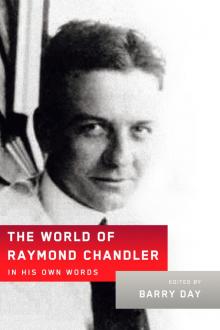 The World of Raymond Chandler: In His Own Words
The World of Raymond Chandler: In His Own Words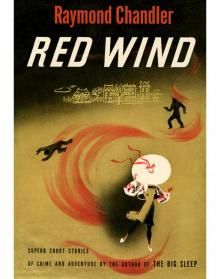 Red Wind: A Collection of Short Stories
Red Wind: A Collection of Short Stories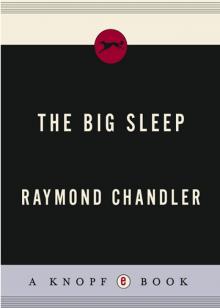 The Big Sleep
The Big Sleep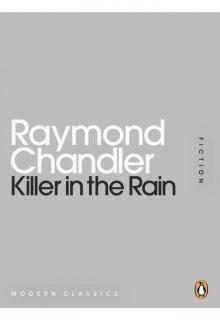 Killer in the Rain
Killer in the Rain Playback
Playback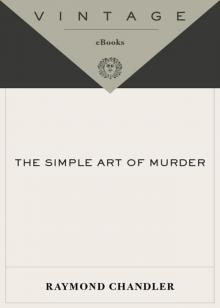 The Simple Art of Murder
The Simple Art of Murder The Bronze Door
The Bronze Door The Little Sister
The Little Sister The Lady in the Lake
The Lady in the Lake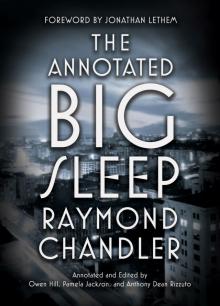 The Annotated Big Sleep
The Annotated Big Sleep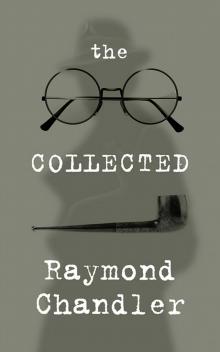 The Collected Raymond Chandler
The Collected Raymond Chandler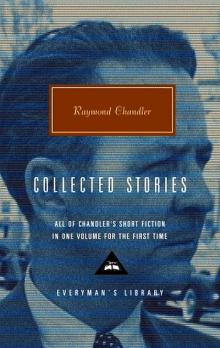 Collected Stories (Everyman's Library)
Collected Stories (Everyman's Library) Farewell, My Lovely
Farewell, My Lovely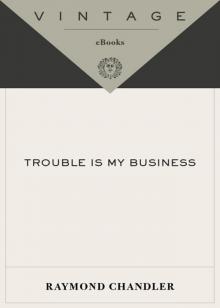 Trouble Is My Business
Trouble Is My Business The Long Goodbye
The Long Goodbye The Lady in the Lake pm-4
The Lady in the Lake pm-4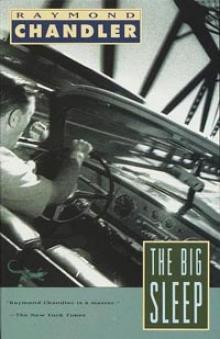 The Big Sleep pm-1
The Big Sleep pm-1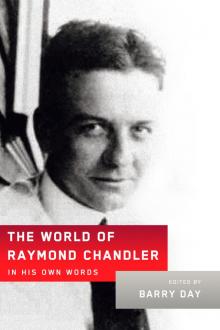 The World of Raymond Chandler
The World of Raymond Chandler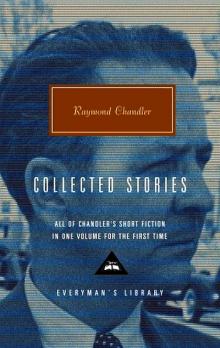 Collected Stories of Raymond Chandler
Collected Stories of Raymond Chandler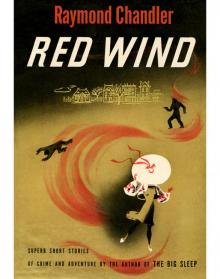 Red Wind
Red Wind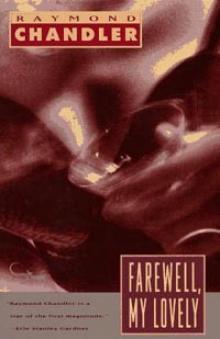 Farewell, My Lovely pm-2
Farewell, My Lovely pm-2 The Raymond Chandler Papers: Selected Letters and Nonfiction, 1909–1959
The Raymond Chandler Papers: Selected Letters and Nonfiction, 1909–1959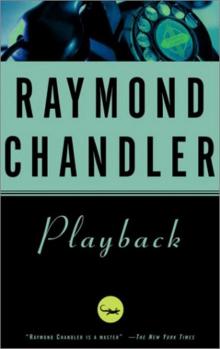 Playback pm-7
Playback pm-7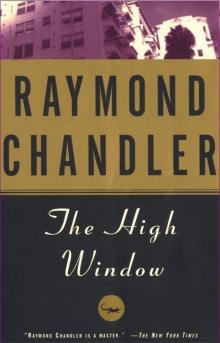 The High Window pm-3
The High Window pm-3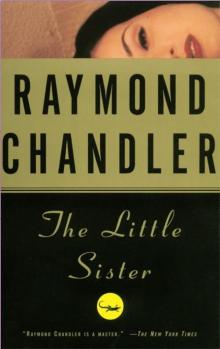 The Little Sister pm-5
The Little Sister pm-5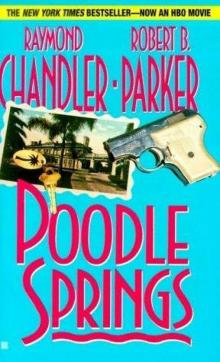 Poodle Springs (philip marlowe)
Poodle Springs (philip marlowe)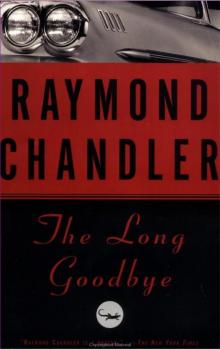 The Long Goodbye pm-6
The Long Goodbye pm-6